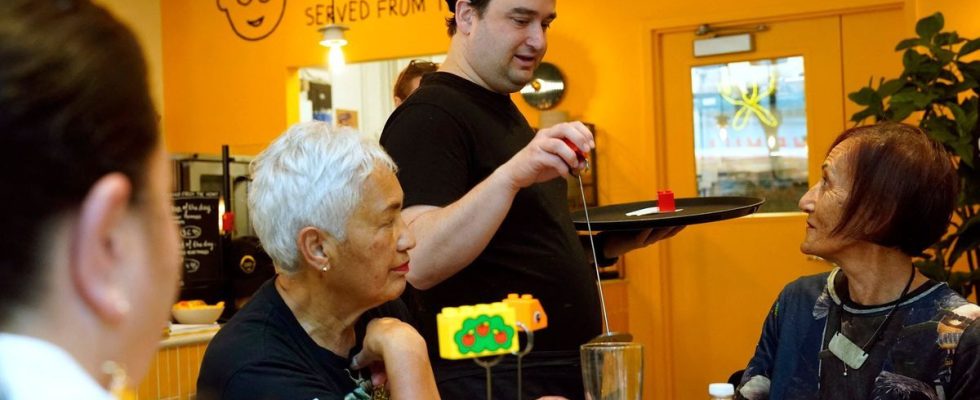Published on
Updated
Reading 3 min.
In the beating heart of business in New York, Café Joyeux, an “inclusive” French restaurant chain with employees with autism or Down syndrome, is launching in the United States in a job market almost closed to people with mental and cognitive disabilities.
Located on the corner of one of Manhattan’s most prosperous arteries, in the middle of imposing skyscrapers housing banks and businesses, Café Joyeux Lexington has occupied since January a harmonious and bright space inaugurated Thursday by the founder of this French solidarity company , Yann Bucaille-Lanrezac.
“We arrive with a lot of humility“, told AFP this 54-year-old social entrepreneur who, with his wife Lydwine Bucaille, opened the first Café Joyeux in Rennes (west of France) in 2017, then 14 others in France, four in Portugal and one in Belgium.
The Parisian restaurant on the Champs-Elysées was inaugurated in 2020 by President Emmanuel Macron and the one in Lisbon, in 2021, by his Portuguese counterpart Marcelo Rebelo de Sousa.
But in New York, neither President Joe Biden nor Mayor Eric Adams are invited to the 21st Café Joyeux, the first in the United States for this association which also sells coffee to shopping centers and businesses in France.
“No lesson to the Americans”
With a total of 169 “team members” in Europe suffering from mental disabilities and cognitive disorders, Mr. Bucaille-Lanrezac does not want to “lecture the Americans”.
Because its Café Joyeux New York is “an American project” in the “Midtown” district of Manhattan, a temple of businesses, banks, lawyers, insurers, hotels and restaurants.
“We get help from specialists in issues of inclusion, difference and mental disability, notably the AHRC and Autism Speaks organizations established in New York for decades” and who work for the social integration of “neurodivergent” people, he explains.
The Frenchman took more than two years to set up a local company with a single shareholder, non-profit, financed by patronage and philanthropy whose donations are tax-exempt, as is the norm in the United States.
In one of the most expensive cities in the world, Café Joyeux is “loaned” for ten years by the real estate developer Boston Property Group, a quiet space with around thirty seats, decorated by interior designer Sarah Oats.
You can taste Italian coffees and simple dishes designed by French chef Thierry Marx, at prices consistent with the cost of living in New York.
To gain a foothold in the ultra-saturated fast food market, still experiencing a labor shortage after the Covid pandemic, Café Joyeux recruited an American director and supervisors without disabilities to take care of “14 disabled team members with autistic, cognitive disorders and Down syndrome“.
Like Peter Anderson, a twenty-year-old “waiter, dishwasher and barista” who laments that, “in many places there (are) no jobs for people with this kind of disability“.
Yet, “we have the same rights as another person who works“, he emphasizes.
80% excluded from employment
According to official statistics, the United States has seven million adults with mental and cognitive disabilities. Some 80% of them are excluded from the labor market.
“It’s very hard for us to find a job, even if we are qualified or even overqualified. You just have to say +I have autism or Down syndrome+ to not be recruited. We are considered a burden and it’s unfair“, testifies to AFP Rachel Barcellona, young autistic person, holder of a university degree and Miss Florida.
For Yann Bucaille-Lanrezac, his new New York employees “have the time to progress, to demonstrate that in the heart of a city with a very demanding and very busy clientele, they can create value and provide a high quality product and service“.
Enough to delight customer Giovana Mullins. This thirty-year-old working in the disability field complains about the poor quality service of American coffee chains on every street corner in New York. “Even without knowing what this (happy) coffee is, we feel the energy and joy that emanates from it“, she enthuses.
